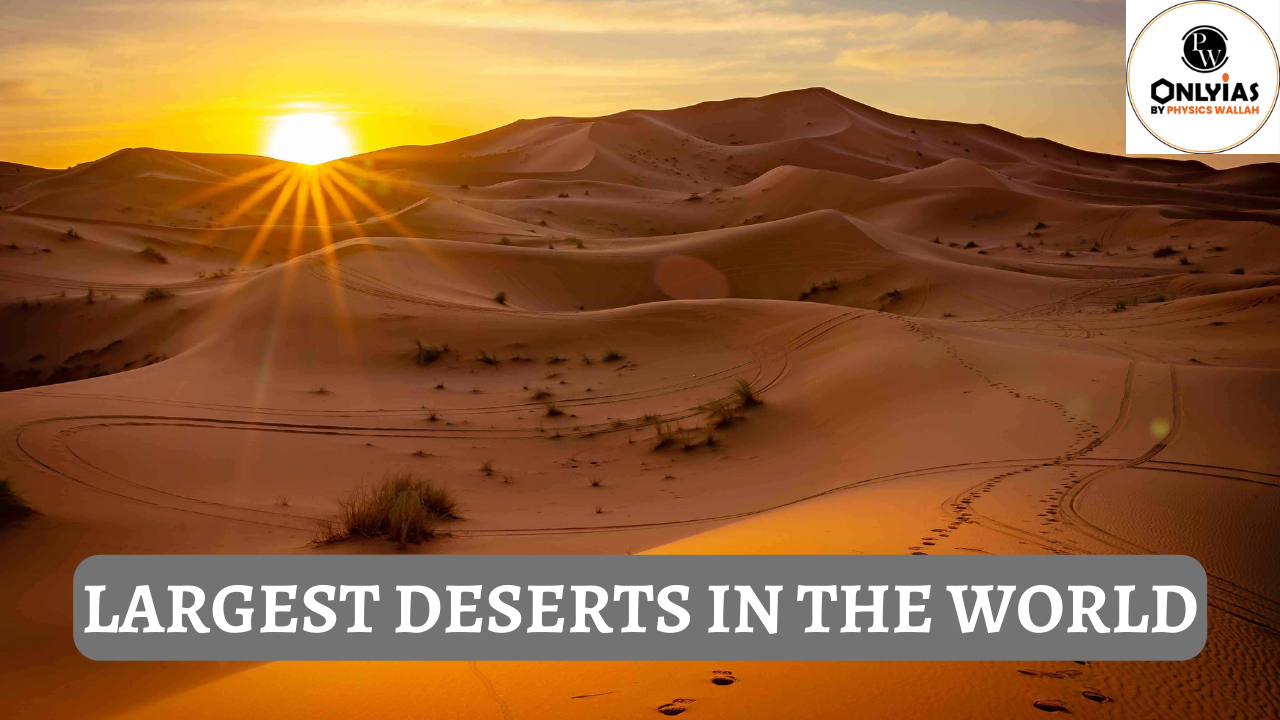
World’s Largest Deserts: In the realm of General Awareness for various Government and competitive exams, an essential topic to explore is the world’s largest deserts. Among these arid expanses, one stands unrivaled in size—the Antarctic Desert. With its vast expanse covering the entire continent of Antarctica, the Antarctic Desert is a unique geographical wonder, encompassing an area so immense that it outshines all other deserts.
But what truly characterizes a desert? These barren lands are defined by their scarcity of precipitation, typically receiving less than 10 inches or 250 millimeters annually. As candidates prepare for their exams, the knowledge of deserts becomes crucial, as 1 to 2 questions may often be expected on this subject. To aid their endeavors, a comprehensive list of the largest deserts in the world is discussed in this article.
The Antarctic Desert stands as the largest desert in the world, encompassing the entire continent of Antarctica. Despite being covered in ice, it meets the criteria of a desert due to its extreme aridity and minimal precipitation. With an impressive expanse covering approximately 14 million square kilometers (5.5 million square miles), it surpasses all other deserts in sheer size. Located in the southern hemisphere, the Antarctic Desert experiences frigid temperatures and harsh conditions, making it one of the most inhospitable places on Earth. Despite its icy appearance, the desert’s arid nature arises from the fact that it receives very little moisture, mostly in the form of snow, which accumulates over centuries.
In contrast to the Antarctic Desert’s icy domain, the Thar Desert claims the title of the largest desert in India. Also known as the Great Indian Desert, it is located in the northwestern part of the Indian subcontinent, spanning across the states of Rajasthan, Gujarat, Haryana, and Punjab and extending into the neighboring country of Pakistan. The Thar Desert covers an area of approximately 77,000 square miles (200,000 square kilometers) and is characterized by its arid and sandy landscape.
Despite its challenging conditions, the Thar Desert has a rich cultural heritage, vibrant traditions, and unique communities that have adapted to thrive in this harsh environment. Deserts, such as the Antarctic and Thar, serve as captivating examples of our planet’s diverse and extreme environments. These barren landscapes play crucial roles in shaping weather patterns, ecosystems, and the lives of people and wildlife that have adapted to survive in such challenging conditions.
Understanding the significance of these largest deserts adds to our knowledge of the world’s geography and highlights the importance of environmental conservation to sustain these unique habitats for generations to come. Therefore, below provided is the list of the largest deserts in the world, along with their locations:
| Also Check |
|---|
| Highest Mountain Peaks in India |
| Gardens in India |
| Bird Sanctuaries in India |
| Important Riverside Cities in India |
| Biosphere Reserves in India |
| National Highways in India |
A desert is a vast, barren land area characterized by very little rainfall and sparse vegetation. It can be hot or cold, and the lack of water makes it difficult for most plants and animals to survive.
The largest deserts in the world are: Antarctic Desert (Antarctica) Arctic Desert (Northern America, Northern Europe, Eastern Europe, North Asia) Sahara Desert (North Africa, West Africa, Middle Africa, East Africa) Australian Desert (Australia) Arabian Desert (Western Asia) Gobi Desert (East Asia) Kalahari Desert (Southern Africa, Middle Africa) Patagonian Desert (South America) Syrian Desert (Western Asia) Great Basin (United States)
Deserts can be classified into different types based on their climate, including: Hot Deserts: High temperatures during the day and cooler nights. Cold Deserts: Cold winters and relatively mild summers with snowfall. Coastal Deserts: Located near coastlines, with milder temperatures due to the sea's moderating effect. Subtropical Deserts: Found in subtropical regions with hot and dry climates. Polar Deserts: Located near polar regions, experiencing extremely cold temperatures. Rain Shadow Deserts: Formed on the leeward side of mountain ranges, resulting in arid conditions. Trade Wind Deserts: Influenced by trade winds that bring dry air, resulting in low humidity and limited rainfall.
Desertification is the process where fertile land becomes desert due to human activities, climate change, or natural causes. Factors like deforestation, overgrazing, improper irrigation, and climate variations contribute to desertification.
Plants and animals in deserts have adapted to conserve water and tolerate extreme temperatures. Some plants have deep roots to access groundwater, while others store water in their tissues. To survive in harsh conditions, desert animals have evolved behaviors and physical adaptations, such as nocturnal activity, efficient water retention, and camouflage.
Contrary to popular belief, deserts are not lifeless places. Many unique plant and animal species have adapted to thrive in these extreme environments. From cacti and succulents to reptiles, insects, and specialized mammals, deserts support diverse life.
<div class="new-fform">
</div>